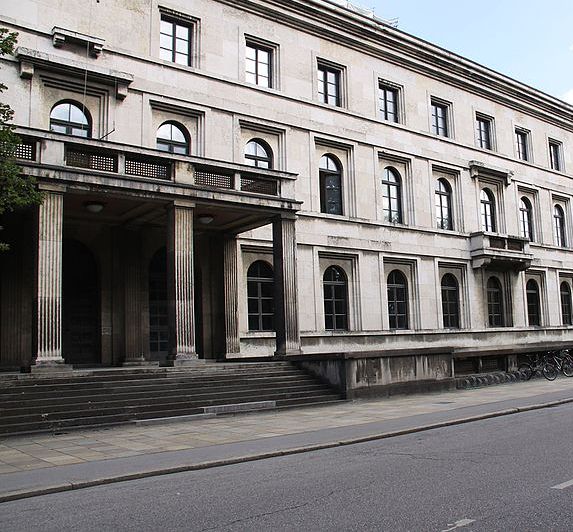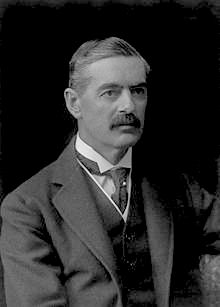
|
17A024 Munich by Jim Davies, 7/25/2017
It's a long story, but recently I had occasion to spend an hour or so in Munich airport, at short notice. It's very splendid, efficient and gleaming, but I saw nothing (on this trip) of the city which is so infamous as the site of the 1938 diplomatic victory by Adolf Hitler. Afterwards, I reflected that this was probably the very airfield (and at that time it was quite likely not much more than a field) where Nevile Chamberlain landed, and later departed, in September 1938. I was one year old at the time, so was a bit too young to influence great events. It's different now, of course. All the history books relate that Chamberlain, together with Edouard Daladier of France and Benito Mussolini of Italy, gave away that part of Czeckoslovakia known as the "Sudetenland" - the part in its West where most people were ethnically German. At the Munich conference, that country was not represented; its leaders were merely informed of the decision. Hitler signed a contract, to the effect that if the Sudetenland were granted to Germany, he would pursue no further territorial ambitions in Europe. So Chamberlain and the others were cock-a-hoop; war over Czeckoslovakia was avoided, and peace was assured "in our time." He landed back in London to universal applause and relief. Later historians admired his triumph with rather less enthusiasm. What nobody seems to have asked is, what were the visitors to Munich in any case doing? - what business was it of theirs, what the German government did? A possible answer is that there had in 1919 been a treaty signed, some of whose provisions the German government appeared to be breaking; but that is hardly true, because the treaty was a diktat, not an agreement among equals. A more accurate answer is that Germans seemed poised once again to become the dominant power on the Continent, and the French and British governments didn't like that. Prestige was at stake.
That conversation occurred even before Chamberlain landed back in London. Accordingly, he had given away a portion of a country he did not in any sense own, in exchange for a promise that was voided almost before its ink was dry. Such is international diplomacy. The reality of the situation (the realpolitik) was that neither side was ready for a big war; Hitler had boasted of far more military force than he actually had so as to intimidate and obtain concessions without general war, while Britain and France were even further from being ready. So a formula was found to postpone the party. Historians blame Chamberlain as an "appeaser" and Hitler as an "aggressor" but actually they were both acting within the constraints of reality. At Munich, they both bought some time. Neither subsequently spent it well. Hitler was understandably elated; his strategy of bombast had once again intimidated the victors of 1918 and another piece of territory, removed by the infamous "Treaty" of Versailles in 1919, had been recovered. The triumph added to his sense of infallibility, but he later traded on that much too heavily. That's a tall order, and in doing so he might have ended his own career; but since he was to die of cancer anyway in 1940, I wonder whether he had, in 1939, some sense that his life was in any case drawing to a close. The debate would have been vigorous, with Churchill leading the pro-war opposition, and he would have had to explain why an entire generation had been sacrificed in vain a quarter century earlier; but the outcome would have been a radical reduction in the esteem in which government, in the UK at least, was held. A useful step in the right direction; and, of course, peace. In the event he used the year badly, by rearming Britain and by being deeply offended when Hitler's government took the whole of Czeckoslovakia as well as just its Western edges, and then set its sights on the ethnically German city of Danzig in Poland. With appalling folly, he followed the counsel of FDR and drew a "line in the sand" over Poland that propelled his country into war in September, 1939. So was the peace-seeker obliged to declare the most disastrous war in human history. When governments exist, that kind of thing happens. |
|
||||||||||||||||||||||||||||||||||||||||||

 Reinhard Spitzy, the foreign minister's secretary, walked down the steps of the Munich conference building right behind the Leader and Ribbentrop as they left it, and overheard the latter ask "But what about that written undertaking?" along with the former's reply "Forget it, it means nothing."
Reinhard Spitzy, the foreign minister's secretary, walked down the steps of the Munich conference building right behind the Leader and Ribbentrop as they left it, and overheard the latter ask "But what about that written undertaking?" along with the former's reply "Forget it, it means nothing." Chamberlain, meanwhile, could have used the year he had purchased in Munich by leading his country to reconsider the whole injustice of Versailles, and he'd have had plenty of support. That would have meant admitting that its premise (that Germans began WW-I) was false, and that blame for it should have been shared among all the governments involved.
Chamberlain, meanwhile, could have used the year he had purchased in Munich by leading his country to reconsider the whole injustice of Versailles, and he'd have had plenty of support. That would have meant admitting that its premise (that Germans began WW-I) was false, and that blame for it should have been shared among all the governments involved.








